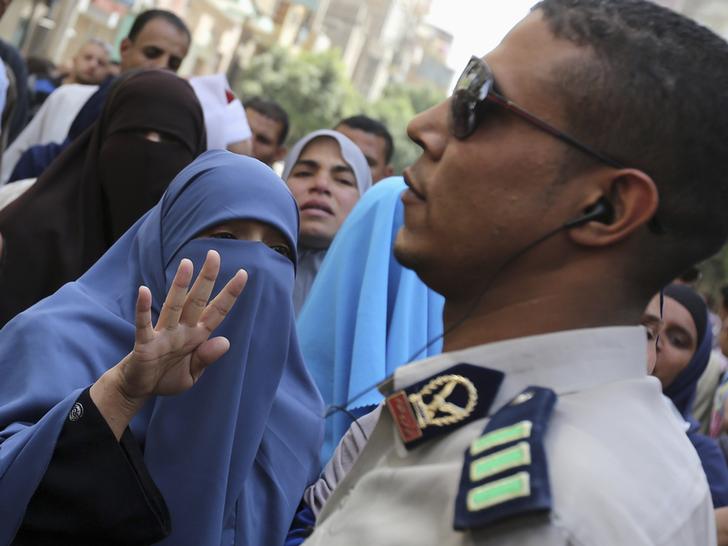Latest NEWS
- Aswat Masriya, the last word
- Roundup of Egypt's press headlines on March 15, 2017
- Roundup of Egypt's press headlines on March 14, 2017
- Former Egyptian President Hosni Mubarak to be released: lawyer
- Roundup of Egypt's press headlines on March 13, 2017
- Egypt's capital set to grow by half a million in 2017
- Egypt's wheat reserves to double with start of harvest -supply min
- Roundup of Egypt's press headlines on March 12, 2017
Spike in death sentences in Egypt and Nigeria in 2014 increased worldwide figures – Amnesty International

Relatives and families of supporters of ousted Egyptian President Mohamed Mursi do the Rabaa sign in front of security forces, after hearing the death sentence, at a court in Minya, south of Cairo, April 28, 2014. REUTERS/Mohamed Abd El Ghany
CAIRO, Apr 1 (Aswat Masriya) - Egypt ranked high among the top countries which issued death sentences and carried out executions in 2014, according to an Amnesty International report released on Tuesday.
The report, titled "Death Sentences and Executions; 2014", provides statistics for the number of death sentences handed worldwide in 2014, as well as the number of executions carried out.
The percentage of death sentences issued worldwide in 2014 increased by 28 percent in comparison to the previous year, Amnesty reported, adding that at least 2466 people in 55 countries were sentenced to death.
A spike in death sentences issued in Egypt and Nigeria is the main cause of the increase of worldwide sentences, the report added.
In Egypt, the number of death sentences served in 2014 jumped to 509 from 109 in the previous year, said the report. It described some of these death sentences as being issued after "unfair trials".
Egyptian courts handed death sentences to hundreds of defendants in different trials last year, most of whom are believed to be supporters of the Muslim Brotherhood, accused of committing acts of murder, attempted murder and other charges. However none of these sentences are final, and some were appealed in higher courts and nullified.
Commenting on a decision last February by the Court of Cassation to overturn death sentences issued earlier by a criminal court, the Egyptian Foreign Ministry said in a statement that the decision was "the latest reflection of the independence, fairness, and transparency of Egypt's judiciary."
Amnesty owed the increasing use of the death penalty worldwide to "real or perceived threats to state security and public safety posed by terrorism, crime or internal instability."
"There is no evidence that the death penalty has a greater deterrent effect on crime than terms of imprisonment," the Amnesty report read. "Where governments present the death penalty as a solution to crime or insecurity they are not only misleading the public but – in many cases – failing to take steps to realise the goal of abolition recognised in international law."
Executions carried out worldwide meanwhile decreased by 22 percent when compared to 2013, standing at 607 executions.
Twenty-two countries carried out executions reported by Amnesty in 2014, the same number from the previous year. Iran (289 executions), Saudi Arabia (90 executions) and Iraq (61 executions) were the world's top three executioners. The figure excludes the number of those believed to have been executed in China, "where data on the death penalty is treated as a state secret."
The watchdog confirmed at least 491 executions in eight countries in the Middle East alone, which is a 23 percent decrease from the previous year's figure. Whereas Amnesty recorded the issuance of 785 death sentences in 16 countries in the region, representing an increase of over 100 percent from the 2013 figure.
Fifteen executions took place in Egypt, according to Amnesty, making it the seventh biggest executioner in the world.
During the United Nation's Universal Periodic Review session in November, the Egyptian delegation said that the death penalty is part of the system of criminal justice, adding that there is no international consensus over terminating the penalty.










